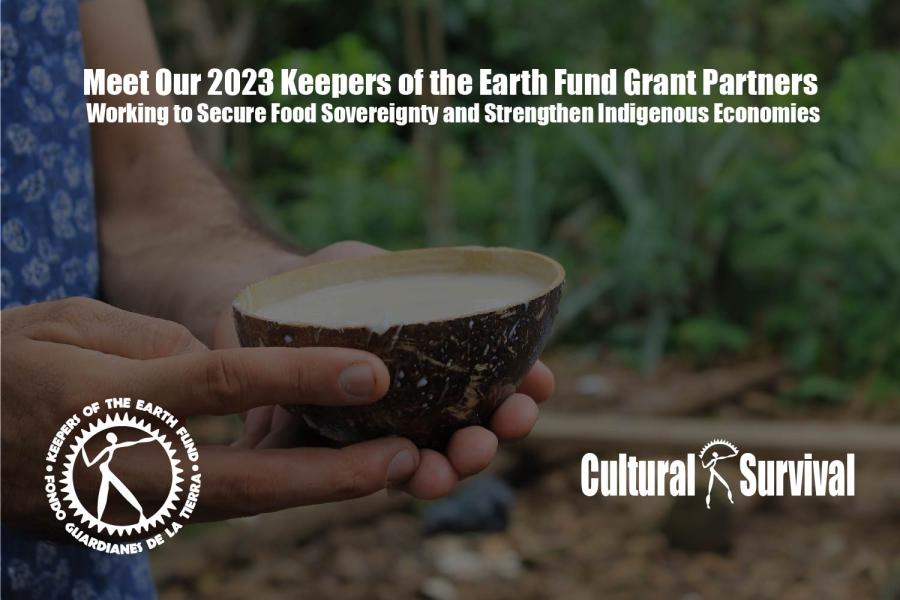
Cultural Survival continues its work in advancing the rights and interests of Indigenous Peoples internationally. From June 5-15, 2023, the Bonn Climate Conference took place in Bonn, Germany, and brought together meetings of two United Nations Framework Convention on Climate (UNFCCC) subsidiary bodies: the Subsidiary Body for Scientific and Technological Advice and the Subsidiary Body for Implementation of the UNFCCC. The meetings set the agenda for discussions and a road map for the upcoming UNFCCC COP28 in Dubai in December.
Indigenous representatives from all seven socio-cultural regions of the world followed the development of documents, negotiations, advocacy for Indigenous rights and interests, and their full and effective participation. Edson Krenak (Krenak), Cultural Survival Lead on Brazil, and Polina Shulbaeva (Selkup), Cultural Survival Consultant on Human Rights Mechanisms, participated as part of the International Indigenous Peoples' Forum on Climate Change (IIPFCC).
On the first day of the Bonn Climate Conference, the International Indigenous Peoples' Forum on Climate Change issued an Opening Statement calling for real reductions in emissions at the source, including the phaseout of fossil fuels, rather than carbon offsets, and calling for prevention rather than compensation in the loss and damage mechanisms. The main talks centered on the following topics.
Global Stocktake
The Paris Agreement obliges States to formulate their own climate protection goals, the so-called Nationally Determined Contributions, and to take action to achieve these goals, but it does not oblige countries to achieve them. The Global Stocktake helps measure joint progress toward long-term goals through three phases: Information Collection and Processing; Technical Evaluation of Information; and the Policy Phase of the Review of Results. The first two phases have been completed, and the third phase of the review process will take place at COP28 in Dubai.. The results will help assess and identify needs and follow-up actions for ecosystem conservation and protection and climate change mitigation and adaptation.
In Bonn, government representatives, intergovernmental organizations and international institutions, scientific experts, and a number of other observers shared their experiences and expertise on mitigation, adaptation to climate change, and good practices in the face of climate-related disasters that have caused loss and damage. In their statement, Indigenous Peoples noted the inadequacy of States' efforts and actions as greenhouse gas emissions and global temperatures continue to rise. All proposed actions must include guarantees for the rights of Indigenous Peoples as affirmed in the UN Declaration on the Rights of Indigenous Peoples and recognized in the preamble of the Paris Agreement.
Indigenous Peoples also renewed their call for real reductions in carbon emissions. This includes the phaseout of fossil fuels and a transition to renewable energy sources through legal approaches that will not replicate the disaster created by the current energy system, which has led to Indigenous Peoples being dispossessed, criminalized, abused, and murdered.
Indigenous Peoples demand fair and ethical engagement with Indigenous knowledge systems and inclusion in adaptation strategies. The full and equitable participation of Indigenous Peoples, including youth, women, people with disabilities, and Traditional Knowledge holders, must be ensured and included in all actions proposed in the Global Stocktake, including in the Political Phase of the review of results and preparation of relevant documents. This process must be open and inclusive to all participants and observers.
Loss and Damage
The second important topic was the loss and damage negotiations, namely, the mechanisms of compensation and the provision of funding to support countries affected by climate disasters, as well as the mandate and future work of the new fund for vulnerable countries established at COP27.
As part of this work, a second Glasgow Dialogue was held to discuss financing mechanisms to prevent, minimize, and address loss and damage associated with the adverse effects of climate change. Discussions also took place on the Warsaw International Mechanism, the Santiago Network, and the new "Loss and Damage" Fund for Vulnerable Countries.
Indigenous Peoples have repeatedly noted that the impacts of climate change cause serious damage to their lives and overall well being, not least of which includes the physical loss of lands, waters, territories and resources, but also the cultural loss of identity, languages, and science. Members of the International Indigenous Peoples' Forum on Climate Change affirmed and emphasized that no amount of monetary compensation can compensate for the losses affecting their way of life. Compensation mechanisms for loss and damage, and discussions at the Global Stocktake, should prioritize prevention of loss and damage over compensation.
Indigenous Peoples from all regions must have direct access to adequate and sustainable funding for adaptation, mitigation, and loss and damage, and States must be held duly accountable. They stressed that all mechanisms and measures on loss and damage, including the Loss and Damage Fund and the Santiago Network, must recognize, respect, promote, and protect the rights of Indigenous Peoples, ensure their full and effective participation in decision-making processes, and provide fair, direct, and facilitated financial access for Indigenous Peoples. Such mechanisms should actively prevent loss and damage, including noneconomic loss and damage related to the adverse effects of climate change, and should include provisions for rapid response mechanisms to emergency situations.
Just Transition
One of the key issues for future negotiations at COP28 will be the Just Transition, namely the Just Transition Work Program (JTWP), which was established at COP27 in Sharm El-Sheikh, Egypt last November.
Today, many developing countries cannot afford to make a Just Transition due to the lack of necessary funding and access to "true" green renewable energy sources (which include solar, tidal, wind, but not hydroelectric dams or nuclear energy), and capacity building, such as programs to retrain workers from carbon mining to renewable energy fields. Achieving global equity and justice for all countries and stakeholders will require that all aspects of implementing mitigation and adaptation measures—including decision making, finance, technologies, and education—recognize and include the contributions of Indigenous Peoples, and are based on human rights and international law.
Indigenous Peoples recognize the need to be part of the Just Transition Work Program. Therefore, when considering climate change issues, including issues of JTWP, parties should respect, promote, and consider obligations on the rights of Indigenous Peoples as affirmed within the UN Declaration on the Rights of Indigenous Peoples. Any negotiations, workshops, seminars, or exchange of knowledge and experience should ensure the participation of Indigenous Peoples.
The parties must recognize that the current transition to a low-emission economy is unfair and damaging to the territories and waters of Indigenous Peoples, further increasing inequality, violating their rights, and destroying Indigenous land, which has major implications on their traditional ways of life and culture, language, and spirituality.
COP28: An Oil and Gas Conference
COP28 will be held in December in Dubai, United Arab Emirates, under the presidency of Sultan Al-Jaber, who is managing director and group CEO of the Abu Dhabi National Oil Company, one of the world's largest oil corporations.
The main themes are expected to be promoting the phaseout of fossil fuels and the Just Transition. 2022 was a year of record profits for the oil and gas sector worldwide, which happened amid a global energy crisis triggered by Russia's aggression in Ukraine. Record profits are an indicator of increased carbon dioxide emissions into the atmosphere, thus exacerbating the climate catastrophe faced by Indigenous Peoples around the world.
Representatives of Conference Parties and observers have varying attitudes about COP28 being manipulated by the oil sector. There are concerns that future COPs will promote the broad interests of fossil fuel and business corporations, and there are ethical concerns about this UN conference in particular, given that the president of the COP is the head of an oil company that is damaging the climate with its waste, oil and gas spills, and greenhouse gas emissions. “We need to end corporate sponsorships of COPs and UNFCCC processes. Big Polluters (both the fossil fuel industry and other emissions-intensive industries) shouldn’t be able to literally bankroll these climate talks. Money talks, so if Big Polluters are writing the checks, we know who is also pulling the puppet strings. We need a conflict of interest policy which is part of a broader Accountability Framework that protects climate policymaking and prevents entities with private, polluting interests from unduly influencing or undermining UNFCCC activities and processes,” wrote the authors of Climate Action Network International’s daily ECO newsletter.
Many Parties have joined the Beyond Oil and Gas Alliance in calling for a phaseout of fossil fuels in a fair and equitable manner, and COP28 could be an opportunity for Al-Jaber to demonstrate that he is serious about addressing climate change and make climate negotiating history as the man under whose presidency a historic decision for the oil and gas industry might be made. Every year we hear that the age of fossil fuels is over, and there are repeated calls to reduce fossil fuel emissions. But statistics and the climate crisis show that most countries are not reducing production, and are continuing to adopt national plans to increase production significantly.
Conference Parties are already looking ahead to COP29, with a location in Europe to be determined, and COP30, which is planned for Brazil (also called Paris +10) and will sum up the results of the first decade of the adoption of the Paris Agreement. The agenda for these meetings will be shaped by the upcoming COP28—particularly in regards to the Just Transition and oil-extracting industries.
In a closing statement of the IIPFCC delivered on June 15, 2023, the Indigenous Peoples Caucus said, “We call for parties to ensure active participation of Indigenous Peoples in the decision-making of the loss and damage fund, which must strive for prevention while also addressing the cultural losses connected to our identities and lifeways. Adaptation must ethically and equitably engage with Indigenous Peoples’ knowledge systems to prevent maladaptation and violations of our rights. Mitigation efforts must include real reductions at the source, and ensure that the green energy transition does not recreate the removal, dispossession, and criminalization that Indigenous Peoples continue to face in the current energy system.”
There can be no climate justice without the full and effective participation of Indigenous Peoples and respect for Indigenous Peoples’ rights.
Top photo courtesy of IIPFCC.



